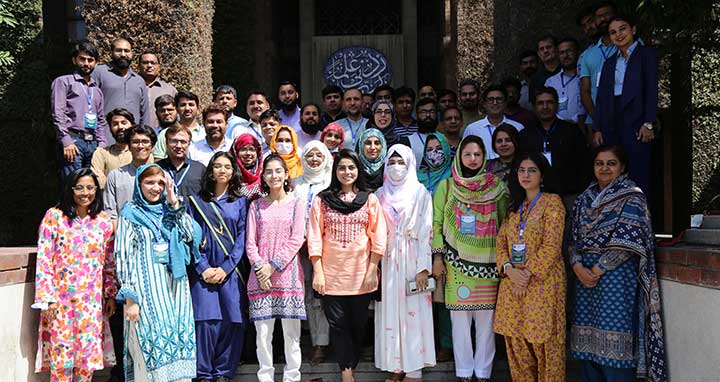LAHORE (June 24, 20022): Education experts at a two-day workshop have emphasized the need for providing an opportunity to students in public sector schools to narrow their innate interest in maths and the traditional learning environments as it would help in encouraging their mathematical thinking, mainstreaming mathematics, and collectively creating new knowledge.
The workshop on maths circles was organized at the Lahore University of Management Sciences (LUMS) here on Friday.
The event was part of the STEAM Pakistan project led by the Ministry of Federal Education and Professional Training in partnership with the Malala Fund. This is the first effort of its kind in Pakistan to mainstream maths circles among Pakistani school-going students.
Key speakers at the event included the Founder of Math for Love, Mr. Dan Finkle; Prof. Dr. Mayada Shahada from the University of Bahrain, and the Chair of the Maths Department at LUMS Prof. Dr. Imran Anwar. Students and faculty focal persons from STEAM Pakistan’s partner universities from across Pakistan participated in the workshop.
In his opening remarks, Dr Imran Anwar, Chair of the Maths Department, LUMS, said, “There continues to be a gap between a child’s innate interest in maths and the extent to which traditional learning environments provide them with an opportunity to explore this fascinating subject. We hope to bridge this gap by mainstreaming the practice of maths circles in government schools across Pakistan.
” Talking about the concept of maths circles, the organizers on the occasion shared that they were essentially learning spaces that engaged participants in mathematical enrichment activities. Such spaces are aimed at encouraging mathematical thinking, mainstreaming mathematics, and collectively creating new knowledge. In her remarks, Head of Partnerships with the STEAM Pakistan project Sana Kazmi said that Maths Circles are one of the core program activities of STEAM Pakistan through which faculty members and students of our partner universities will visit government schools to attract children towards maths by introducing them to concepts and problems through fun, relatable activities that they will learn as part of this two-day workshop. “We are confident that our efforts will inspire a generation of learners in Pakistan, especially young girls, to approach maths with curiosity and love instead of fear,” she added. According to Dr. Mayada Shahada, she understands that this was a first-of-its-kind event in Pakistan and it will prove instrumental for the evolution of maths learning in Pakistan and make greater space for global linkages. Highlighting the significance of STEAM Pakistan, Javed Malik, Programme Director Malala Fund Pakistan, said that the STEAM Pakistan is a collaborative project through which they are providing support to the Ministry of Federal Education and Professional Training to advance secondary school-aged girls’ access to science, technology, engineering, arts, and mathematics education in Pakistan.
The STEAM model of education essentially adopts an integrated approach to learning that propagates cross-disciplinary learning among students and capacitates them from an early age to think critically, work collaboratively, independently devise creative solutions and become resilient problem solvers.

